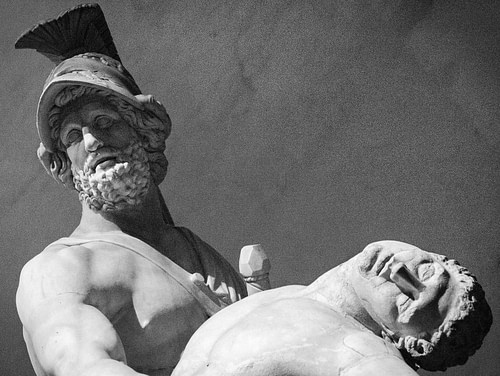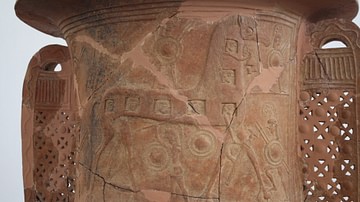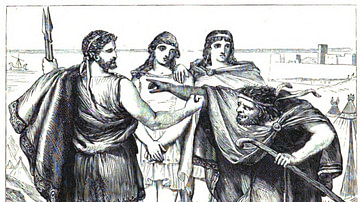
Patroclus is a figure from Greek mythology who fought in the Trojan War and was most famous for his close friendship with the Greek hero, Achilles. He followed Achilles to Troy and would ultimately die because of him and his actions.
Patroclus' story is most famously told in Homer's (c. 750 BCE) Iliad, a retelling of the great Trojan War and one of the most epic stories of all time. He is portrayed as a kind and loyal man, loved by his comrades and cherished by Achilles.
Early Life
Patroclus was the son of Menoetius, one of the Argonauts (a band of Greek heroes) and the king of Opus (according to some sources). His mother is usually listed as Polymele, Sthenele, Periopis or Philomela. When Patroclus was young, he accidentally killed a youth over a game of dice. As a result, he was exiled from Opus and sent to the court of King Peleus of Phthia to atone for his crime. It was in Phthia that he became inseparable from Achilles, King Peleus' son. Patroclus was older than Achilles and considered a good role model as he was a balanced, kind and thoughtful youth.
According to Pseudo-Apollodorus in his Bibliotheca, Patroclus was one of the young hopefuls who hoped to marry Helen, the most beautiful woman in the world. After Helen had run off with Paris of Troy and war had been declared between the Greek city-states and Troy, Patroclus followed Achilles to the Trojan shores. Patroclus was caring and sensible, while Achilles was hotheaded and impatient. So it was thought that Patroclus would keep him in line and be a good influence.
Trojan War
Throughout the Iliad, Patroclus is portrayed as Achilles' right-hand man, often carrying out chores for him. However, he plays a more prominent role after Achilles argues with King Agamemnon of Mycenae over his slave-lover Briseis and after he refuses to fight anymore, just to spite Agamemnon.
In Book 11, a sulking Achilles sent Patroclus to find out which of the Greeks had been wounded after he saw Nestor, the king of Pylos, escorting a few men back into the Greek camp. Patroclus was warmly welcomed by Nestor and was asked when Achilles would come to the aid of his fellow Achaeans. He reminded Patroclus about how he found him at Achilles' side when he went to Phthia to recruit Achilles for the Trojan War and how King Peleus had counted on him to guide Achilles, telling Patroclus that he may be the only one who could change Achilles' mind about fighting.
As Patroclus rushed back to Achilles, determined to convince him to fight again, he came across the injured Thessalian king Eurypylus, who told Patroclus how badly the Greeks were suffering on the battlefield. Patroclus cleaned his wound and stopped the bleeding. He was still in King Eurypylus' tent when he heard the Trojans storm the wall and ran off to tell Achilles everything he had learnt about the ongoing battle.
Patroclus Fights
Book 16 is where Patroclus' story takes centre stage in the Iliad. Patroclus begged Achilles to let him fight while wearing his armour, not being able to stand by and do nothing while his fellow countrymen died: "And give me your own fine armour to buckle on my back, so the Trojans might take me for you, Achilles, yes." (Iliad, 16.46-47)
Achilles felt pity for Patroclus and agreed that he should wear his armour and lead the Myrmidons into battle. However, he begged Patroclus to return and not to be tempted by the call of glory. This fateful decision will seal Patroclus' fate. Patroclus donned Achilles' armour, leaving behind his spear, which only Achilles had the strength to wield. Patroclus eagerly charged at the Trojans with the Myrmidons at his back and a war cry on his lips:
Myrmidons! Brothers-in-arms of Peleus' son Achilles!
Fight like men, my friends, call up your battle-fury!
Now we must win high honour for Peleus' royal son.
far the greatest fighter among the Argive fleet,
and we who fight beside him the bravest troops. (Iliad, 16.315-320)
The Trojans instantly mistook Patroclus for Achilles. Indeed, Patroclus seemed to channel Achilles' fearless nature and fierceness on the battlefield, as he was the first to hurl his spear and run fearlessly into the fray. He managed to trap the Trojans between the Greek ships and the Greek army, refusing to let them retreat behind the safe walls of Troy. Sarpedon, the son of Zeus and a Trojan ally, watched Patroclus kill Trojan after Trojan and vowed to kill him. Zeus was saddened to see two great fighters go against each other, but his wife Hera persuaded him to let Sarpedon die, so he could finally be at peace. Patroclus stuck his spear into Sarpedon's midriff and killed him, much to the despair of the Trojans.
The Death of Patroclus
Zeus pondered Patroclus' fate while he continued to fight the Trojans in a mad frenzy.
If only he had obeyed Achilles' strict command
he might have escaped his doom, the stark night of death.
But the will of Zeus will always overpower the will of men. (Iliad, 16.803-805).
Patroclus attempted to take the mighty walls of Troy four times but was stopped by Apollo each time, who told him that the walls of Troy were not fated to fall to him or even to the famous Achilles. Hector is encouraged by Apollo to join the fight. Waiting for his chance, Hector watched as Apollo knocked Patroclus' helmet off, shattered his spear and removed his armour, leaving him defenceless. Before Patroclus knew what was happening, the Trojan Euphorbus launched a spear into his back.
Hector waiting, watching
the greathearted Patroclus trying to stagger free,
seeing him wounded there with the sharp bronze
came rushing into him right across the lines
and rammed his spearshift home,
stabbing deep in the bowels, and the brazen point
went jutting straight out through Patroclus' back. (Iliad, 16.951-957)
The Achaeans watched in horror as Patroclus was struck down. With his dying breath, Patroclus declared that he would have been successful if the gods had not betrayed him and warned Hector and the Trojans that Achilles would avenge him. King Menelaus of Sparta rushed to protect Patroclus' body and Achilles' armour. A fierce battle took place over Patroclus' remains. Still, the Greeks were ultimately successful in getting Patroclus' body and Achilles' armour back to their camp.
Once Achilles had learned of Patroclus' death, he fell to the ground and cried out in grief. The captive women, including Briseis, joined him in his distress, wailing and letting out mournful cries. Achilles promised Patroclus that he would not bury him until he had avenged his death and ordered his men to wash Patroclus' body before covering him in a white linen shroud. In Book 22, the mighty Achilles and Hector faced each other in an epic battle, and Achilles was finally able to avenge Patroclus.
The Greeks prepared Patroclus' body for the funeral pyre. They covered his body with locks of hair and built a timber pyre 100 feet (30 m) in length. They sacrificed sheep, cattle, horses, dogs, and captive Trojans and placed them on the pyre with Patroclus, along with jars of honey and oil. Boreas, the god of the north wind and Zephyrus, the god of the west wind, were both summoned to help the pyre burn. Achilles instructed his men to put the fire out and collect Patroclus' bones to place in a golden urn before sealing it with a double layer of fat and stowing the urn in the barrow they had made for him. Finally, they covered his urn with a light linen shroud and held funeral games in his honour. Achilles never stopped mourning the death of his beloved friend until he, too, is killed by Paris.
Patroclus & Achilles
The exact nature of the relationship between Patroclus and Achilles has been discussed and debated for years. Homer never specifically mentions that they are lovers. Still, there is no doubting how close they are to one another in the Iliad. They sleep in the same tent, often with captive women, indicating that they are comfortable engaging in sexual relations in front of each other. This perhaps hints at a possible sexual relationship between Patroclus and Achilles without the need to label it. Achilles gives the captive Iphis to Patroclus, while Patroclus plays an integral part in elevating Briseis as Achilles' favourite bedmate. Nevertheless, it is clear to anyone who reads the Iliad that the strongest and most important relationship is the one between Patroclus and Achilles.
Later ancient authors like the Greek tragedy playwright Aeschylus (c. 525 to c. 456 BCE) wrote about Patroclus and Achilles being lovers in his play the Myrmidons, of which only a few fragments survive. In Fragment 35, Achilles mourns over the dead body of Patroclus, reflecting on their relationship and how Patroclus was ungrateful for his kisses and did not show reverence for Achilles' respect of his thighs, indicating a sexual relationship. In Plato's (428/427-348/347 BCE) Symposium, the protagonist Phaedrus acknowledged that Patroclus and Achilles were lovers and labelled their relationship as the purest form of love. The statesman and orator Aeschines (c. 389 to c. 314 BCE) also referred to Patroclus and Achilles as lovers in his speech Against Timarchus, where he stated that Homer's reluctance to label their relationship made it clear to him that the two were lovers.
Depictions Outside of the Iliad
Although the Iliad is the best source for Patroclus, he is also present in non-Homeric myth, indicating that he had a role outside of the Iliad and the Trojan War. Patroclus is mentioned in a reimagining of the epic poem the Cypria by Proclus, where he was said to be involved in the selling of the Trojan prince Lycaon, even though he had nothing to do with it in the Iliad. In his Olympian, the ancient Greek lyric poet Pindar (c. 518 to c. 448/447 BCE) describes how Patroclus joined Achilles on an expedition to Mysia (modern-day Asia Minor).
One of the most well-known depictions of Patroclus is the famous scene found on the red-figure Sosias Cup (c. 500 BCE), where Achilles is seen tending to a wounded Patroclus. As nothing like this took place in the Iliad, it is thought that this represents a scene outside of Homeric myth. Other ancient Greek black-figure vases show Patroclus at Phthia before the Trojan War.
Legacy
Although Patroclus' role in Greek mythology is relatively minor compared to other more famous figures, he was a pivotal character in the Iliad and the Trojan War. He was much-loved among the Greeks, fought bravely, and his death was the only thing that could convince the mighty and stubborn Achilles to fight once more for the Greeks. No matter how his relationship with Achilles is viewed, it is undeniable that their relationship is at the heart of the Iliad and it is a story that has endured to this day.










